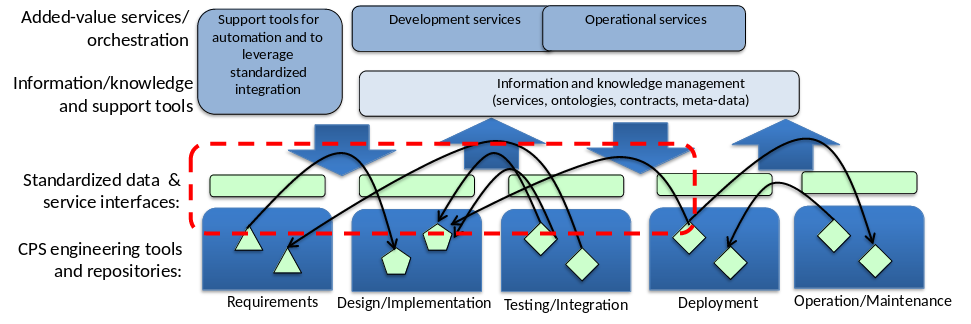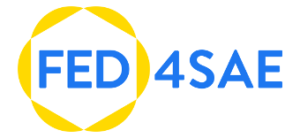Information
| Partner: | KTH, Sweden |
| Advanced Technology: | AIDE Data management tools |
| Contact: | Jad El-khoury |
| Email: | jad@kth.se |
AIDE: Data management tools for the engineering of CPS
The development of Cyber-Physical Systems (CPS) includes multiple experts from different disciplines. This implies that there will be multiple sets of system descriptions that jointly describe the entire system including its design and verification (compare with software, electronics hardware, communications, mechanical packaging, reliability and safety engineering).
CPS development will thus typically be characterized by fragmented product descriptions such as requirements, design descriptions, models, source code, hardware descriptions, configuration data, etc. All these fragments will be stored and managed through a number of tools and databases. Since these fragments are interrelated, it is important to be able to relate them to each-other, to keep them consistent, and to understand how a change in one artefact impacts other – and in an efficient way. A typical example is to be able to find test-cases corresponding to a particular requirement.
To address this problem, the overall objective of AIDE is to lower the threshold of integrating and managing data among software tools, thereby improving end-user processes, in turn with potential for improvements in time to market, more effective use of resources and product quality. This is accomplished by providing support tools – for creating tailored “tool-chains” and integrations of data for the engineering of CPS. The approach targets data integration based on open standards (such as OASIS OSLC, and the Linked Data family of standards) and open source software. Fig. 1 illustrates the scene of fragmented data/tools and how making data available opens up possibilities to create added value services. The focus of the existing AIDE support tools is indicated by the red encirclement.

AIDE software assets:
As an integral part of the open-source OSLC Lyo project, Lyo Designer is a tool that supports architects and developers with the architecting, design and implementation of integrated tool chains, compliant with the OSLC standard. Lyo Designer consists of a toolchain modelling tool, and an accompanying code generator that produces OSLC-compliant tool adaptors, integrating the designed tools.
Lyo Designer complements the Lyo SDK – the set of Java libraries that helps the community adopt OSLC specifications and build OSLC-compliant tools.
AIDE’s tool support also includes a number of open source components which have been developed with a number of partners over the years such as
- Lyo Store – a library that provides a simple interface for working with a triplestore via Java objects representing OSLC Resources. (https://github.com/eclipse/lyo-store)
- Linked Data Visualizer – A tool to visualize objects and relations from a triplestore as graphical nodes and lines. (https://github.com/FindOut/ldvis)
What are typical use cases
Lyo Designer has been used and validated by a range of industrial partners. Moreover, since its release, close collaboration with external partners (Ericsson, FindOut, IBM, OFFIS, Scania, Thales and Volvo) have been established. These partners are using as well as extending the platform in coordination with KTH.
As indicated by Fig. 1 and the red encirclement, there are several opportunities to extend the current capabilities of the AIDE Lyo Platform. At KTH in collaboration with industrial partners we are currently pursuing work in the following directions:
- Supporting the operational phase of cyber-physical systems through interfaces for data gathering from operational CPS and for controlling such CPS. This includes concepts such as digital twins.
- Data warehousing facilities, in which a protocol is being implemented and extended that allows for the real-time communication of operational data across a CPS.
How easy is it to use it and what about gaining access?
The AIDE assets target toolchain architects and developers of tool interfaces. The adopted model-based approach aims to lower the threshold of adopting the OSLC standard for industrial developers. Lyo Designer allows one to work at a higher level of abstraction, with models to specify the overall architecture as well as specific tool designs, without needing to deal with all the technical details of the OSLC standard (such as Linked Data, RDF, etc.). Its accompanying generator also helps in the rapid prototyping of the tool interfaces.
Most of AIDE’s software assets are part of the Eclipse Lyo project, and are released under the EPL license. Details of the Lyo project can be found under its Wiki pages (https://wiki.eclipse.org/Lyo).
Where can I find more information?
A full description of the AIDE assets can be found here:
- Lyo Designer – https://wiki.eclipse.org/Lyo/ToolchainModellingAndCodeGenerationWorkshop
- Lyo Store – https://wiki.eclipse.org/Lyo/Store
Further information and support can be obtained from KTH – see contacts.
Contacts:
Jad El-khoury (KTH), jad@kth.se
Martin Törngren (KTH), martint@kth.se

